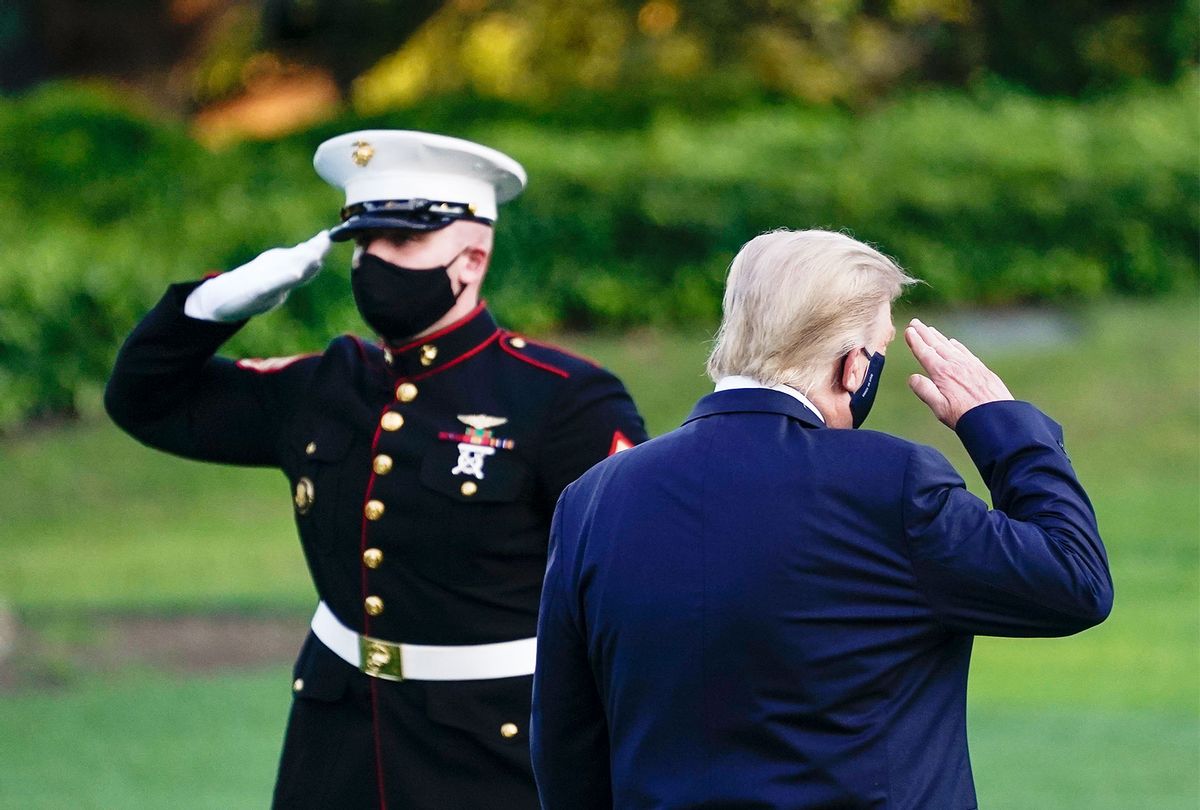Amid all the essential questions that the White House refuses to answer about Donald Trump's COVID-19 infection, journalists should pay particular attention to the ones it is refusing to answer most aggressively.
Possibly chief among those is: When was Trump's last negative test? Reporters have repeatedly asked and the Trump team steadfastly refuses to say, even though there ought to be nothing remotely controversial about it.
"I don't want to go backwards," was the latest smiling brushoff, this one from White House physician Sean Conley on Monday afternoon. "Everyone wants that," he chuckled after he was asked again, and again refused to say.
White House press secretary Kayleigh McEnany, who has since tested positive herself, was asked on Sunday whether Trump had been tested before he went to the debate with Joe Biden in Cleveland last Tuesday. McEnany bristled: "Yeah, I'm not going to give you a detailed readout with timestamps every time the president's tested."
What this strongly suggests, of course, is that Trump's last negative test was not recent and, in particular, that he either wasn't tested — or perhaps even tested positive – before Tuesday night's debate.
That positive-test scenario isn't inconceivable if you consider that the White House seems to consider results from its problematic rapid-response tests dispositive only when they are negative.
We need to find out when Trump's last negative test was. We need to find out how often Trump was tested. And of course we need to find out if he had a positive test before the ones on Thursday.
According to the current White House timeline, Trump tested positive on a rapid-response test Thursday evening — then basically lied to Fox News' Sean Hannity by saying he didn't have results yet — before it was "confirmed" with a more reliable test later that night, making it official.
But did he test positive on a rapid-response test before that? Or — here's another possibility — did he stop taking regular tests precisely because he had reason to believe he was infected?
As Reuters reporter Jeff Mason told Democracy Now on Monday: "The one thing they have been saying repeatedly throughout the last several weeks and months of this pandemic is that he is tested very regularly. I think many people assume that that would mean that he is tested on a daily basis, which would have included that Tuesday of that debate."
Everybody besides Trump and his entourage was tested independently, but Trump arrived too late. Debate moderator and Fox News host Chris Wallace said that Trump was on the "honor system."
If Trump can be shown to have known or suspected that he was infected on Tuesday, or earlier, then the world will know he chose to endanger Biden and everyone else at the debate rather than do the responsible thing and bow out.
And as we can never forget, Trump was even more irritable and sweaty than usual that night. Similarly, on Wednesday, Trump traveled to Minnesota for a rally but inexplicably cut it short.
Of course, Trump putting his own interests ahead of everyone else's would hardly be out of character. It's already public knowledge that he went to a fundraiser in New Jersey on Thursday after knowing — at the very least! — that he had been exposed to COVID via his adviser Hope Hicks.
According to rules that most of the rest of us follow, he should have quarantined right then and there, at the very latest.
Why block contact tracing?
Another hugely important topic that Trump's team has been cagey about is contact tracing. Assuming that the Sept. 26 Rose Garden party for Amy Coney Barrett was a super-spreader event, which it certainly appears to have been, you'd think they'd want to find out what happened and try to stop the spread going forward.
But, oddly, they don't.
In fact, they seem to be preventing it.
This despite the fact that, as Apoorva Mandavilli and Tracey Tully wrote in the New York Times on Monday:
Any of the closely packed guests and staff members at the Rose Garden ceremony could have gone on to transmit the virus to many others, so the White House's decision not to investigate the cluster of infections, and pinpoint the source, has potentially devastating consequences for hundreds of people, several experts warned.
The obvious question then is: What are they hiding?
It's an enormous outbreak, so everything about it is embarrassing, but the brazenness of the response suggest White House officials are worried about something specific coming out about how the super-spreader was allowed into the festivities.
And when you think about it, the most likely reasons for that are either that the White House testing system coughed up a critical false negative — or that someone who should have been tested wasn't.
As with most other White House visitors allowed in proximity to the president, attendees were tested using the Abbott Laboratories ID Now rapid test. But as Sarah Toy and Daniela Hernandez reported for the Wall Street Journal on Sunday: "Some studies have shown that the Abbott Now ID test, which can produce a result in minutes, has around a 91% sensitivity — meaning 9% of tests can produce false negatives."
They quoted Ashish Jha, dean of Brown University's School of Public Health, as saying: "A metal detector that misses 10% of weapons — you'd never, ever say that's our only layer of protection for the president."
So that's possibility No. 1: The White House's vaunted protection mechanism against outsiders carrying the virus is ineffective, and did not remotely justify the violations of mask-wearing and social-distancing rules that have been amply chronicled at the event.
But possibility No. 2 is that the super-spreading was an inside job — that White House staffers attending the event had either been poorly tested or not tested at all.
Rachana Pradhan, Lauren Weber and Liz Szabo reported for Kaiser Health News on Friday that the White House has been using a new, different test — an antigen test, also from Abbott Laboratories — to screen its own staff:
The test, known as BinaxNOW, received an emergency use authorization from the Food and Drug Administration in August. It produces results in 15 minutes. Yet little is independently known about how effective it is. According to the company, the test is 97% accurate in detecting positives and 98.5% accurate in identifying those without disease. Abbott's stated performance of its antigen test was based on examining people within seven days of COVID symptoms appearing.
So maybe that test failed spectacularly.
But it could also be that White House staff isn't being tested as diligently as we thought. That would be consistent with the White House's refusal to say when Trump himself last tested negative.
And it would be in character. Doesn't it seem likely that Trump's family and other favorites weren't being tested often, if at all — and that one of them brought the virus to the party?
That would be a secret worth fighting to protect.
The cocktail question
Here's another question the White House is energetically obfuscating: When exactly did Trump get his IV with the super-experimental Regeneron cocktail?
That cocktail is considered most likely to be effective before the infection really sets in, so it's safe to assume he took it fairly soon after his medical team realized he was infected.
At the Saturday press conference, medical-team member Brian Garibaldi said Trump had received the cocktail 48 hours earlier — which would have been Thursday morning.
In a memo ostensibly "correcting" that statement — as well as Conley's own statement that indicated an initial diagnosis on Wednesday morning — Conley wrote that Trump "had received" the cocktail on Friday. That leaves open the possibility that he got it earlier.
A related key question: When did the White House reach out to Regeneron to get a dose? It would have required special permission and delivery from Regeneron, as well as clearance from the FDA.
The big picture
There are of course many important questions about Trump's medical condition that remain unanswered. For instance, Conley unsubtly dodged questions on Monday afternoon about whether Trump had pneumonia or any other kind of lung problems. We actually know very little, factually, about his current condition.
But the unanswered questions regarding his past conduct have something important in common: They address whether Trump considered the moral as well as personal consequences of his actions.
And although most of us know the answer to that already — because it's always the same answer — members of Trump's team are fighting to obscure these specific facts, presumably because they would depict Trump's astonishing lack of personal responsibility with even more resonance than usual.
So whenever the un-cover-up finally happens, it could be brutal.




Shares